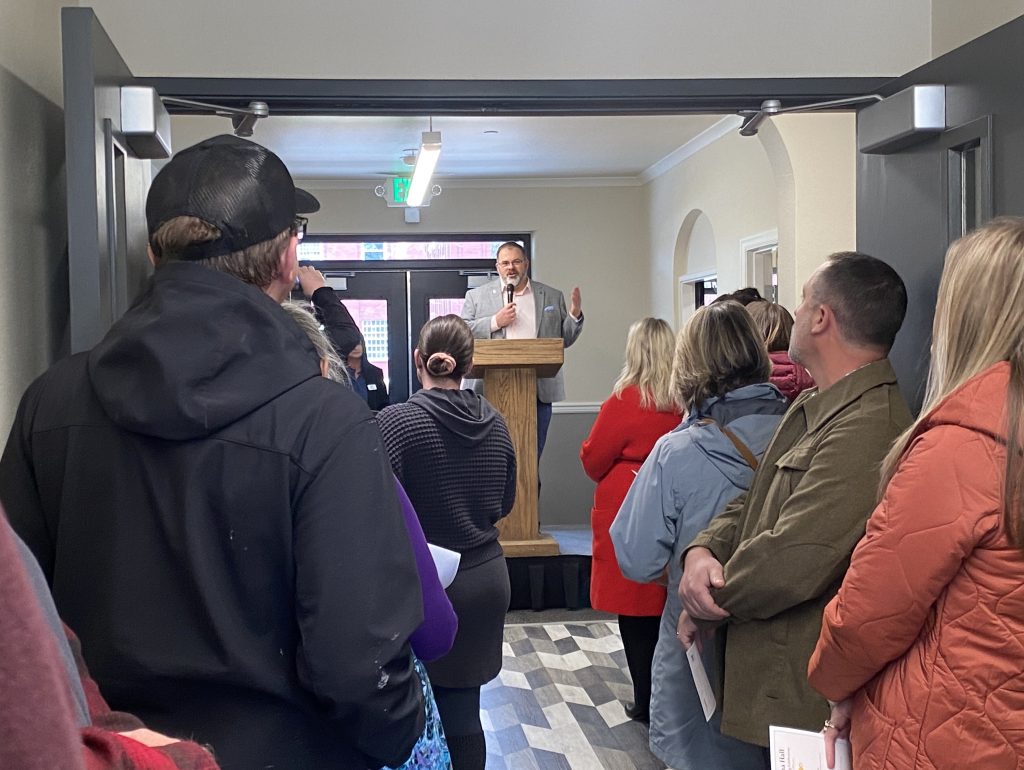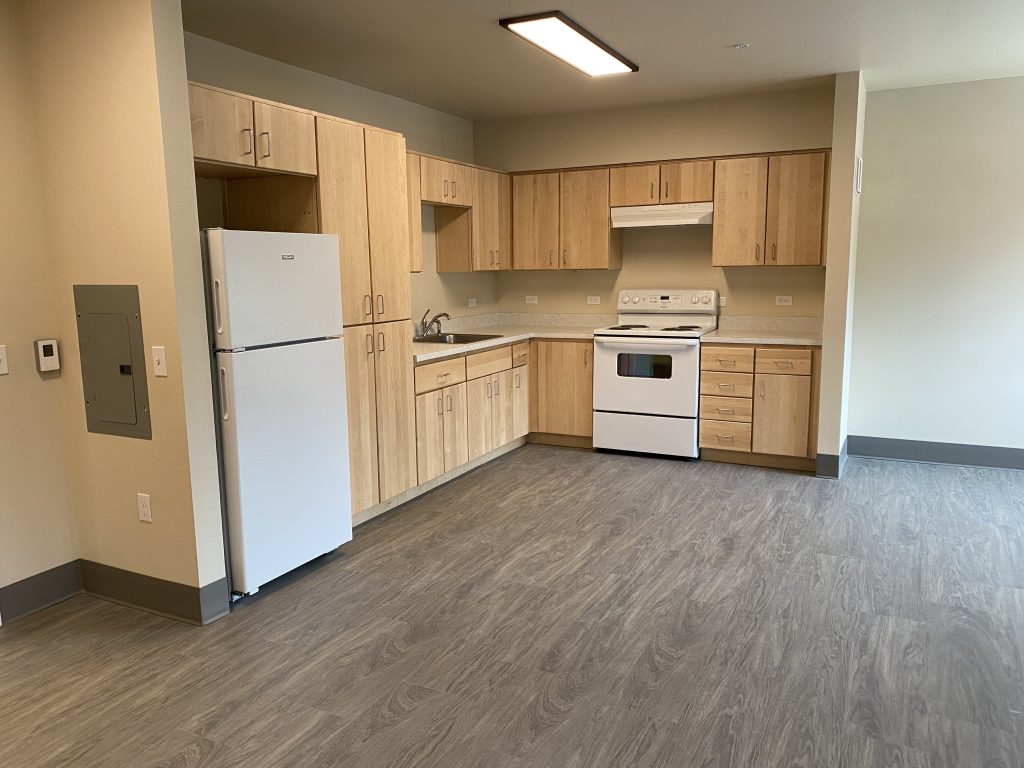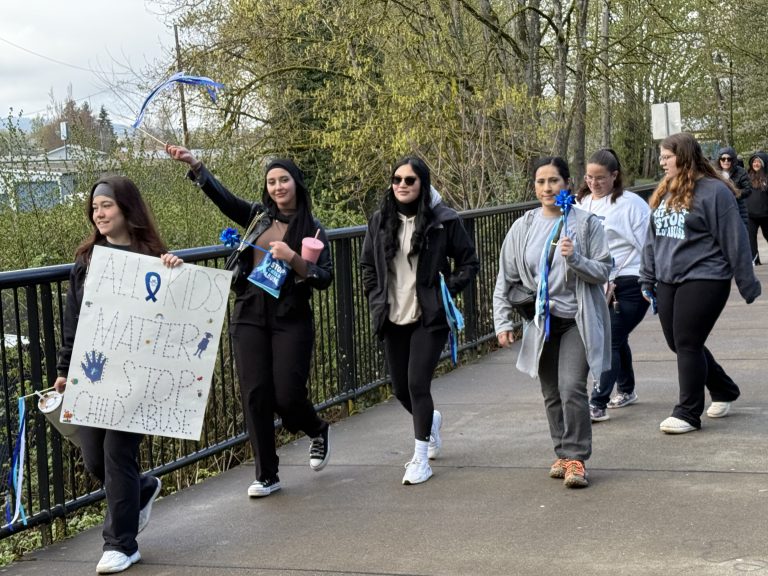Affordable housing project to open May 1 after years of delays, cost spikes

Construction is nearly complete to turn a former nurses’ dormitory into 52 affordable apartments managed by the Salem Housing Authority. The project is expected to house up to 155 people.
The Yaquina Hall Apartments are slated to start accepting residents on May 1, with 20 apartments reserved for people with serious and persistent mental illness.
The project at 2720 B St. N.E. broke ground in late 2021 following years of delays while Salem has faced a mounting shortage of housing. Built in 1947, Yaquina Hall once was the home for nurses working at Oregon State Hospital.
Tenants can use housing vouchers through the U.S. Department of Housing and Urban Development toward rent. Those making less than 60% of the area’s median income are eligible for such a subsidy.
A single person earning $33,240 is at 60% of the Salem area’s median income. A family of four making $47,460 would also be at that level.
Tenants would pay 30% of their income for rent, with the rest covered by the federal government. There is a years-long waiting list in Salem to get into housing with such vouchers.
The Oregon Health Authority provided $6.1 million to help with the development.
Yaquina Hall will provide services to help homeless people and those with disabilities move toward permanent housing. They include services related to employment, education, healthcare management and treatment, according to Courtney Knox, the city’s strategic initiatives manager.
Observers piled into the building’s narrow entrance hall on Wednesday, April 5, to celebrate the project’s grand opening.
Salem Mayor Chris Hoy spoke at the event about his late mother, who struggled with mental illness. He said she died while a patient at the state hospital because at the time, there weren’t enough programs like Yaquina Hall.
“My goal is a home for every neighbor, and the completion of Yaquina Hall will help move us towards that,” Hoy said in a news release. “These units, and the services that come with them, will be a lifeline to over 52 individuals experiencing significant challenges finding stability and a home.”

Residents aren’t required to participate in services, but service coordinators will help them identify and mitigate the reasons for their instability “through motivational interviewing and trauma-informed care strategies,” according to a news release.
Residents would be referred to services based on the needs they identify and factors such as age, gender, disability status, household size and health conditions. Staff will then create an individual housing stability plan and connect residents to services including food stability, health care and transportation.
The waitlist for the apartments will give some priority to applicants who are disabled, homeless or at risk of homelessness. Preference will also be given to applicants who would benefit from the services provided and have been referred to the waitlist by local providers.
The facility will have 51 one-bedroom apartments and one studio apartment, each with one bath, according to a brochure for the opening.
Budget documents obtained by Salem Reporter showed in April 2017, estimators pegged the cost to renovate Yaquina at $7.8 million. That rose to $13 million by November 2019.
Now, the project will cost about $18.6 million.
Part of the cost will be covered by a $10.8 million federal low-income housing tax credit and a $2.7 million historic tax credit.
Delays required a repeat for some work needed for the conversion. Nicole Utz, housing administrator for the Salem Housing Authority, said in October 2021 that her agency had to do three environmental analyses on the project because the first two expired, and a third was needed to meet legal requirements.
The city and the state signed an agreement in December 2016 but couldn’t finish the deal until surveying work was done. Meantime, the state had to make improvements including widening roads and adding sewer lines.
City leaders originally expected to buy the property on the state hospital’s north campus in 2018 and have it renovated by early 2019.
The delays prompted then-Mayor Chuck Bennett to send a frustrated letter to the state in January 2020, blaming officials for taking too long to sell the property to the city. Meanwhile, the street improvements still hadn’t been completed and the lots hadn’t been subdivided.
The 47-acre property has since been divided into lots that will be home to Yaquina Hall, a future park and a private housing development.
In September 2018, the state reached an agreement to sell 17 acres to Mountain West Investment Corp.
Neighborly Ventures, a Salem-based development company that builds housing in Oregon, Washington, Idaho and Utah, is turning that lot into the 246-unit Jory Apartments at the corner of Park Avenue N.E. and D Street N.E.
Yaquina Hall is listed on the National Register of Historic Places, according to the housing authority’s website.
The facility’s Community Room is dedicated to Andy Wilch, the city’s former housing administrator, “for his 10 years of service at Salem Housing Authority, and for his vision of the historic preservation of Yaquina Hall into housing for the Salem community,” the event pamphlet said.
Wilch announced his retirement in 2019. He died in March.
(DISCLOSURE: Larry Tokarkski, Mountain West Investment Corp. president, is a co-founder of Salem Reporter)

CORRECTION: this story originally included a mistyped project total and misidentified Mayor Chris Hoy’s mother without naming her. Salem Reporter apologizes for the errors.
PREVIOUS COVERAGE
Long-planned affordable housing project could break ground early next year
Salem mayor knocks state officials over years of delays at affordable housing project
Contact reporter Ardeshir Tabrizian: [email protected] or 503-929-3053.
SUBSCRIBE TO GET SALEM NEWS – We report on your community with care and depth, fairness and accuracy. Get local news that matters to you. Subscribe today to get our daily newsletters and more. Click I want to subscribe!

Ardeshir Tabrizian has covered the justice system and public safety for Salem Reporter since September 2021. As an Oregon native, his award-winning watchdog journalism has traversed the state. He has done reporting for The Oregonian, Eugene Weekly and Malheur Enterprise.



